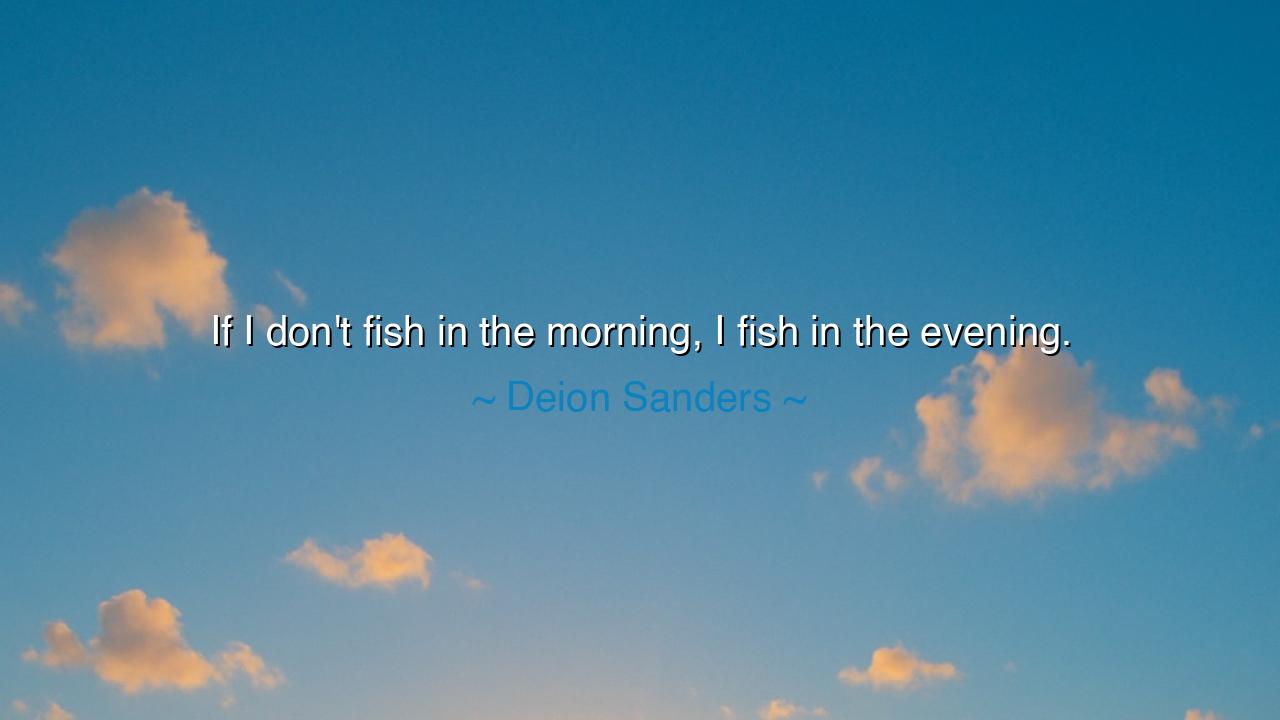
If I don't fish in the morning, I fish in the evening.






"If I don't fish in the morning, I fish in the evening." Thus spoke Deion Sanders, a man of two worlds—gridiron and diamond—whose life was marked by relentless pursuit and unyielding discipline. In these words, he does not merely speak of the pastime of fishing, but of persistence, balance, and the eternal truth that the pursuit of one’s passion must bend with the rhythm of life, but never break. It is a saying wrapped in simplicity, yet beneath it flows the river of deeper meaning: that one must always find time for what feeds the soul.
The morning is the hour of promise, when the world is fresh, the air clear, and the waters still. To fish in the morning is to begin the day with intention, to seek sustenance or solace at the dawn of one’s labors. But life is not always so merciful. Duties call, storms arise, the day may demand other sacrifices. And so Sanders declares the truth of resilience: if denied the morning, he will yet claim the evening, for the passion cannot be silenced, only delayed. This is the wisdom of flexibility, the refusal to yield to circumstance, the determination to pursue joy no matter the hour.
Consider the story of Ernest Hemingway, who in both life and in his tale The Old Man and the Sea revealed the endurance of the fisherman’s spirit. The old man Santiago did not yield when the sea denied him catch after catch; he returned day after day, morning or evening, driven by a calling deeper than hunger. His persistence was itself the victory, and his struggle became a parable for human resilience. Sanders’ words echo this same spirit: the time may change, but the calling remains.
In a broader sense, Sanders’ reflection is not about fishing alone, but about commitment. It is a metaphor for how we pursue our craft, our dreams, our rest, or our renewal. The world will often conspire to take our mornings, to crowd them with obligations and burdens. Yet the wise find another time, another space, to honor what sustains them. For to abandon the practice entirely would be to abandon part of the soul. Whether in work or in passion, the truth holds: the man who persists finds his way, no matter the hour.
There is also humility in these words. For Sanders, whose life was filled with the thunder of crowds and the weight of fame, fishing symbolized the quiet, the grounding, the return to something simple and pure. He reminds us that no matter how grand the battles we fight by day, the soul still requires peace, still requires connection to nature, still requires the balance of silence against the noise. To fish in the evening after missing the morning is not defeat—it is wisdom, a reminder that balance can be restored if we refuse to give up what we love.
The lesson is this: life will not always grant you the perfect time for what matters most. The morning may slip away, stolen by duty or struggle. But if the morning is lost, seek the evening. If the door is closed, find another. Never let the flame of your passion be extinguished by the inconveniences of circumstance. The time may change, but the commitment must not.
Practical action flows from this: examine what brings you renewal, what practice keeps your spirit alive. Perhaps it is prayer, or writing, or walking, or, like Sanders, the casting of a line into quiet waters. Guard it fiercely. If the early hour is lost, reclaim the late one. If the day takes it, claim the night. The important thing is not the moment, but the persistence of the act. In this lies both peace and strength.
Thus the words of Deion Sanders shine not only as a glimpse into his life, but as a teaching for us all. If I don’t fish in the morning, I fish in the evening—for the soul must never be denied the nourishment it seeks. Let this be our guide: to persist, to adapt, and to always return to the waters that renew us.






AAdministratorAdministrator
Welcome, honored guests. Please leave a comment, we will respond soon